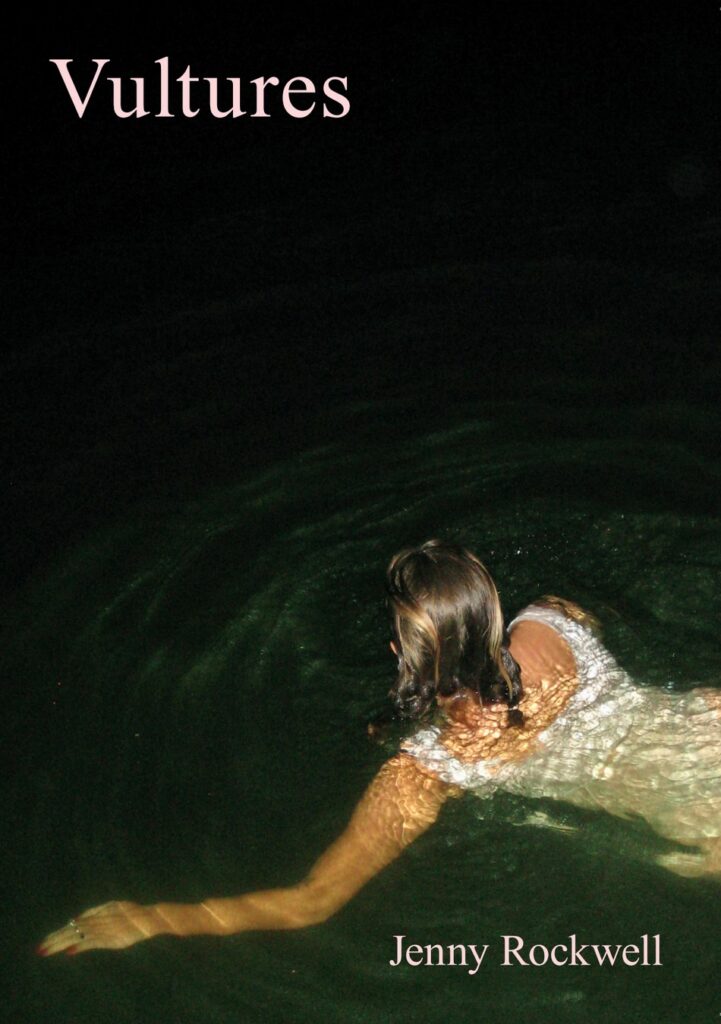Vultures
Vultures by Jenny Rockwell. Dead Bird Books (2024). RRP: $30. PB, 59pp. ISBN: 9781738618231. Reviewed by Dani Yourukova.
Vultures is a vibrant debut from Tāmaki Makaurau poet Jenny Rockwell, lush with emotionality, nosebleeds, glow-in-the-dark Jesus statues, religious shame and grave dirt. A candid coming-of-age narrative set in church basements and girls’ bathrooms, which contains a blend of queer Catholic trauma, romance and horror that is going to emotionally devastate a very specific lesbian subsection of its young female audience. (As an ex-Catholic-school gay with a powder-pink Virgin Mary on my nightstand, I am allowed to say this.)
The first poem of the collection is “The Basement of the Symonds St Chapel is on Fire and Covered in Drag Glitter,” and it comes blasting in with a title that promises a dramatic clash of old religion and queer sensibilities. But from the opening lines, the conflict is situated internally. We see this in the way that the boundary between body and church becomes blurred, as we are invited to imagine ribs caving in like rafters:
‘I want to write a poem about this bible-belted body
how it collapses in
on itself, becomes hallowed’
So when the speaker manifests a ‘tongue a flare that tears through the church attic,’ there’s a sense of both cleansing and self-annihilation, a move that inhabits both the destructive and empowering realities of burning the self down and starting again.
There is occasionally some bluntness of phrasing, or heaviness of repetition that doesn’t work so well for me here, and across the collection more generally. But then, it does seem appropriate for a treatment of Catholic trauma to be preoccupied with the drama of good and evil, and with diametrically opposed statements: ‘I do not want to write a poem about shame / I keep writing poems about shame’ and ‘you are loved / as long as you do not love.’ And of course, the stark inversion of imagery applied while sitting in a church pew, ‘These prayer hands rotting apples, spoiled / soil beneath fingernails cut short,’ contrasted with the moment when the poem contemplates queer love:
‘my love is a steeple,
is a choir yelling loud, is a celebration, is a song,
is a poem, is a hymn, is a rosary
is a quiet church on a hillside’
This strategy of listing a series of images in quick succession for poetic effect seems to be a favourite of Rockwell’s, and it’s effective. It brings a visual force and tremendous propulsive energy to their poetry. It’s also strongly reminiscent of film montage:
‘there is a red helium balloon. there is
a cat that crosses from right to left.
there is a bloated corpse, bed bugs floating.
there is a puddle of blood under a shredded
birthday streamer. there is a broken piano’
This example comes from “Love is an 80s Horror,” a standout poem, in which the two implied young, queer protagonists share a secret romance by the lake, ‘shuddering … a quiet epilogue.’ Though they are able to overcome shame in this moment (‘you touch me and i do not feel dirty’), they are not safe. There is an evil that lurks in the woods. A myriad of quiet horrors beneath the dark water.
The use of classic horror imagery from the likes of It in this context evokes the conservative-religious fear of young women’s sexuality, while adding a doomed inevitability to the proceedings. But as the images layer into a music-video-esque flurried crescendo of gothic drama, resplendent with cracked branches, dead birds and ‘the taste of nickels in our mouths as we kiss,’ the poem finds an ending that is both surprising and completely inevitable: ‘we watch the couple wade / into the wet woods.’
The immediate emotional reality of the action dissipates, and no longer are we fumbling our lover in the fog, or fleeing from a murderer by the lake. Instead, we watch the victims from a distance, and it’s not clear who we are anymore. Zoomed out. Wide shot. As if the screen stutters. As if we are, in this moment, finally aware of the camera.
The collection returns often to issues of perspective, art, and agency in poems like “The Hollywood Graveyard” or “Daisy and the Lighthouse,” the quiet introspection of “Fruit Flies,” and the pointed, callout-post directness of “Wow, a Girl with Real Interests.” Rockwell is a performance poet, and has (at time of writing) 48,000 followers on TikTok, so I imagine that part of the reason the work has such a deft hand in the consideration of art, audience, image and objectification is due to the shape of her own practice.
There’s a wider consideration here too, of girlhood and the pressures of presumed heterosexuality, because in Vultures, the horror of the gaze originates in the act of men looking at young, vulnerable women. The sleazy patriarchs of “The Men and Their Heaving Bellies,” the men who can’t keep their ‘slimy fishing rods’ out of women’s DMs, the unknowable god who lets this all happen. They sit stark against the quieter violence—the good guy friend who pours you too many drinks—and illuminate that violence for what it is, lending a sort of universality to the grotesques. They’re not so much men, as the idea of men, a great churning sea of harm that has been done to women in the name of God, or patriarchy, or convenience. It makes it hard to deny the poet the final line, the loudest of the lines in a collection that begins with a poem about shame:
‘I AM NOT SORRY.’ (“A Limp-necked Blackbird”)
Dani Yourukova is a poet, reviewer, and amateur occultist. Their poetry and essays have been published in places like Sweet Mammalian, The Spinoff, bad apple, and Turbine | Kapohau. Their debut poetry collection Transposium was published by Auckland University Press late last year.
